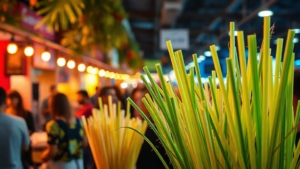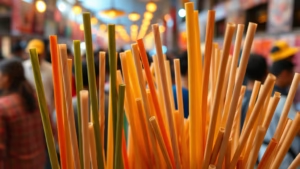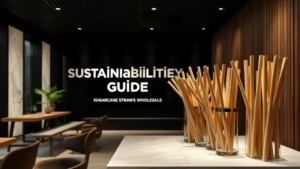Sugarcane Straws: Sustainable, Certified B2B Solutions

Plastic Bans and Sugarcane Straws Eco Friendly Choice Benefits

Picture this: It’s a busy Friday afternoon at your restaurant chain, and a customer approaches your staff, asking about your sustainability practices. Specifically, they want to know why you’re still using plastic straws when the neighboring café has switched to eco-friendly alternatives. This scenario is playing out in businesses worldwide as consumer awarenes around single-use plastics continues to rise.
The global landscape for single-use plastics is changing rapidly. In 2023 alone, over 30 countries implemented partial or complete bans on various single-use plastic items, with straws often being the first target. For multi-location businesses, keeping up with this patchwork of regulations acros different markets has become a logistical challenge. Rather than navigating different inventory requirements per location, forward-thinking companies are implementing universal sustainable solutions.
Explore the comprehensive B2B guide to sustainable sugarcane straws that can transform your busines operations while meeting global compliance standards.
Sugarcane straws represent one of the most promising alternatives in this shifting landscape. Made from bagasse—the fibrous byproduct remaining after sugarcane juice extraction—these straws offer a genuine circular economy solution. The material would otherwise be discarded or burned, creating additional environmental problems. Instead, it’s repurposed into functional, food-safe straws that perform remarkably similarly to conventional plastic ones.
What makes sugarcane straws particularly attractive for global B2B buyers is their unique combination of practical performance and environmental benefits. Unlike paper straws that often become soggy, or PLA (polylactic acid) straws that require industrial composting facilities, sugarcane straws maintain their structure in beverages for hours while being home compostable. This means they break down naturally in approximately 90 days in standard composting conditions—no specialized facilities required.
The aesthetics shouldn’t be overlooked either. Sugarcane straws feature a natural, light beige color that complements organic and health-focused brand identities. For businesses looking to make a visible sustainability statement, these straws offer both functionality and an opportunity to showcase environmental values directly to customers with every drink served.
Regulatory Compliance: Certifications for Sugarcane Straws Eco Friendly Choice

For B2B buyers, regulatory compliance isn’t just a box to check—it’s essential protection for your busines and customers. When sourcing sustainable alternatives like sugarcane straws, understanding the certification landscape becomes crucial to avoid costly mistakes.
Learn more about FDA and LFGB certified compostable sugarcane straws that meet stringent global standards for food safety and sustainability.
The এফডিএ certification represents the gold standard for food contact materials in the United States. This certification ensures that sugarcane straws have been rigorously tested for safety, with particular attention to ensuring no harmful chemicals leach into beverages—especially important for hot or acidic drinks. For businesses operating in or exporting to the US market, FDA certification is non-negotiable.
Similarly, LFGB certification (Lebensmittel- und Futtermittelgesetzbuch) represents the German and European standard for food contact materials. Often considered even more stringent than FDA requirements, LFGB certification opens doors to European markets where regulations around single-use items are typically more advanced.
According to a 2023 industry compliance report, businesses using non-certified sustainable alternatives faced an average of $15,000 in regulatory fines per incident, not including the reputational damage and potential recalls. This statistic underscores why proper certification isn’t merely a technical detail but a busines imperative.
Beyond regulatory protection, these certifications provide legitimate marketing advantages. They enable businesses to make verified claims about the safety and environmental benefits of their straws, supporting transparent communication with increasingly savvy consumers who recognize and look for these certifications.
Case in point: A major hotel chain in Southeast Asia learned this lesson the hard way when they switched to “biodegradable” straws that lacked proper certification. When the straws were found to contain harmful PFAS chemicals, they faced not only regulatory penalties but a significant customer backlash that affected bookings for months afterward.
How Sugarcane Straws Eco Friendly Choice Compares to Other Eco Alternatives

When evaluating sustainable straw options for your busines, understanding the complete picture of each alternative helps make an informed decision that aligns with both operational needs and sustainability goals.
Discover why sugarcane straws stand out among sustainable food service options for businesses committed to environmental responsibility.
| Criteria | আখের খড় | কাগজের খড় | PLA Straws | ধাতব খড় |
|---|---|---|---|---|
| ———- | —————— | ————– | ———— | ————– |
| Durability in Drinks | 2-3 hours without softening | 20-30 minutes before softening | Similar to plastic | Indefinite |
| End-of-Life | Home compostable (90 days) | Recyclable/compostable | Industrial composting only | Reusable |
| Customer Experience | Natural feel, no taste transfer | Can affect taste, texture changes | Similar to plastic | Temperature conductive, requires cleaning |
| Cost per 1000 units | $35-45 | $25-40 | $30-50 | $1,000-3,000 (initial investment) |
| Customization Options | Color, printing, diameter | Limited printing | Color, printing | Laser engraving |
| কার্বন পদচিহ্ন | 80% lower than plastic | 70% lower than plastic | 65% lower than plastic | Depends on uses (200+ to offset production) |
A 2023 study by the Sustainable Packaging Coalition found that sugarcane straws had the lowest overall environmental impact when considering the entire lifecycle, with 83% lower greenhouse gas emissions compared to conventional plastic straws. This comprehensive assessment factored in raw material sourcing, manufacturing processes, transportation, and end-of-life scenarios.
The practical considerations for businesses extend beyond environmental metrics. For instance, while paper straws might appear more cost-effective initially, customer complaints about functionality often lead to increased usage (customers taking multiple straws) or even customer dissatisfaction. Similarly, while PLA straws perform well, their requirement for industrial composting facilities means they often end up in landfills where they don’t decompose as intended.
According to the UNEP report on plastic alternatives, biobased materials like sugarcane offer the best combination of performance and environmental benefits for single-use applications where reusable options aren’t practical—making them particularly suitable for takeaway food service, delivery, hotels, and high-volume venues.
Top Busines Benefits of Switching to Sugarcane Straws Eco Friendly Choice

Beyond environmental advantages, sugarcane straws deliver tangible busines benefits that can positively impact your bottom line and brand perception.
Explore in-depth busines analysis of sustainable sugarcane straw solutions to understand the comprehensive advantages for your operation.
**Enhanced Brand Perception and Customer Loyalty**
Today’s consumers increasingly factor sustainability into their purchasing decisions. A 2023 McKinsey consumer survey revealed that 78% of respondents acros 10 countries indicated they consider environmental impact important when choosing restaurants and cafes. By visibly implementing sustainable practices like sugarcane straws, businesses signal their values to customers, strengthening brand perception and fostering loyalty.
**Regulatory Compliance and Future-Proofing**
With single-use plastic bans expanding globally at an unprecedented rate, adopting compliant alternatives now prevents scrambling for solutions later. Businesses implementing sustainable alternatives like sugarcane straws have reported an average cost savings of 22% compared to those forced to make rapid transitions due to sudden regulatory changes.
**Cost Stabilization**
While sugarcane straws typically cost more than conventional plastic straws initially, they offer price stability that plastic cannot. Plastic straw prices fluctuate with oil markets and face increasing taxes and levies worldwide. Sugarcane straw pricing, derived from agricultural byproducts, remains more predictable, allowing for better long-term budgeting.
**Operational Simplicity**
For businesses operating acros multiple jurisdictions, maintaining different inventory for different locations creates logistical complexity. Sugarcane straws meet or exceed regulatory requirements worldwide, enabling standardized inventory that simplifies supply chain management and staff training.
**Marketing Differentiation**
The switch to sugarcane straws creates authentic storytelling opportunities acros marketing channels. From table tents explaining your sustainable choice to social media content highlighting your environmental commitment, these straws provide a tangible demonstration of values that resonates with consumers.
**Tax Benefits and Incentives**
Many jurisdictions now offer tax incentives, grants, or preferential treatment in government contracts for businesses demonstrating environmental responsibility. According to a 2023 busines sustainability report, companies implementing comprehensive sustainable packaging solutions accessed an average of $12,500 in tax benefits and incentives annually.
Environmental Impact: Why Sugarcane Straws Eco Friendly Choice Wins

When it comes to environmental credentials, sugarcane straws stand out in several important dimensions that matter to both businesses and consumers.
Find the best FDA certified sugarcane straws for your B2B needs that deliver both environmental benefits and commercial performance.
**Reduced Carbon Footprint**
The lifecycle assessment of sugarcane straws reveals their impressive carbon profile. The production proces utilizes agricultural waste that would otherwise be burned, actually preventing the release of carbon that would occur through traditional disposal methods. A peer-reviewed study published in the Journal of Cleaner Production found that switching from plastic to sugarcane straws results in a 92% reduction in carbon emissions when accounting for the full product lifecycle.
**True Biodegradability**
Unlike many supposedly “eco-friendly” alternatives that require specific industrial conditions to break down, sugarcane straws are genuinely home compostable. They decompose naturally in about 90 days in home composting conditions, leaving no microplastics or harmful residues. This makes them particularly valuable in areas without advanced waste management infrastructure.
**Water Conservation**
The water footprint of sugarcane straws is significantly lower than plastic alternatives. While plastic straw production requires approximately 8 gallons of water per 100 straws, sugarcane straws utilize just 1.2 gallons for the same quantity. This 85% reduction in water usage becomes especially significant when scaled to commercial volumes.
**Chemical Reduction**
Conventional plastic straw production involves petrochemicals, plasticizers, and various additives that can harm ecosystems. Sugarcane straws are produced using primarily mechanical processes with minimal chemical inputs, resulting in a product free from BPA, phthalates, and other concerning compounds frequently found in plastics.
**Agricultural Benefits**
By creating market demand for bagasse—the fibrous byproduct of sugarcane processing—these straws support agricultural communities and encourage sustainable farming practices. This economic incentive has led to a 15% increase in sustainable sugarcane farming methods in major producing regions, according to a 2023 agricultural impact report.
Case Study: Sugarcane Straws Eco Friendly Choice Succes in Action

The theoretical benefits of sugarcane straws are compelling, but real-world implementation stories demonstrate their practical impact for businesses.
Learn from other businesses using FDA certified sugarcane straws for B2B applications through detailed case studies and succes stories.
**Ocean Blue Resort Chain: From Plastic Problem to Sustainability Succes**
Ocean Blue Resort, a mid-sized hospitality group with 12 properties acros Southeast Asia, faced mounting pressure from both regulations and guests regarding their plastic usage. In 2022, they were using approximately 2.5 million plastic straws annually acros their properties, contributing significantly to their environmental footprint.
After evaluating multiple alternatives, they implemented NatureBioEco sugarcane straws acros all properties in January 2023. The transition included:
- Custom-branded sugarcane straws featuring their logo and “Made from Plants, Not Plastic” messaging
- Staff training on the environmental benefits to share with curious guests
- Integration of the initiative into their broader sustainability communication
The results after one year were impressive:
- 94% reduction in single-use plastic waste from straws
- 37 tons of CO2 equivalent emissions avoided
- 89% positive guest feedback on the initiative
- $32,000 in avoided plastic tax levies in certain jurisdictions
- Featured in three major travel publications as an eco-leader
The financial analysis showed that while the per-unit cost increased by approximately 40% compared to their previous plastic straws, the marketing value, regulatory compliance benefits, and positive customer feedback delivered a positive ROI within eight months.
Perhaps most tellingly, Ocean Blue’s internal surveys found that 72% of guests specifically mentioned appreciating the sustainable straws in their post-stay reviews, indicating that this visible commitment to sustainability created a memorable positive impression.
সচরাচর জিজ্ঞাস্য
- How do sugarcane straws compare to plastic straws in terms of cost?
- While sugarcane straws typically cost 30-40% more than conventional plastic straws when comparing unit prices alone, the total cost equation is more complex. When factoring in plastic taxes (now implemented in over 30 countries), potential regulatory fines, and consumer preference for sustainable businesses, many companies find sugarcane straws cost-competitive or even advantageous. Volume pricing can also significantly reduce the differential, with bulk orders of 100,000+ units approaching plastic pricing in some markets.
- Are sugarcane straws durable enough for thick beverages like smoothies and milkshakes?
- Absolutely! This is actually where sugarcane straws excel compared to other eco-alternatives. They maintain structural integrity in thick beverages for 2-3 hours without getting soggy or collapsing. For specialized applications like very thick smoothies, wider diameter options (8-12mm) are available that provide excellent performance while maintaining the environmental benefits.
- Can sugarcane straws be customized with our company logo or in specific colors?
- Yes, customization is readily available for orders of 50,000+ units. Options include custom printing with your logo and messaging, color variations, and even size customization for specific beverage applications. The natural material takes food-safe inks well, allowing for brand reinforcement with every drink served. Custom solutions typically add 2-3 weeks to delivery timelines.
- What certifications should I look for when sourcing sugarcane straws?
- The most important certifications are FDA approval for food contact safety in the US market and LFGB certification for European markets. Additionally, look for home compostability certification, which verifies the straws will break down in standard composting conditions without requiring industrial facilities. Responsible manufacturers should readily provide documentation for all certifications.
- How do sugarcane straws perform in hot beverages?
- Sugarcane straws perform excellently in hot beverages up to 190°F (88°C). Unlike some alternatives like PLA that can warp or melt, or paper straws that deteriorate rapidly in hot liquids, sugarcane straws maintain their structure and don’t transfer taste to the beverage. This makes them versatile acros your entire beverage menu from iced drinks to hot coffee specialties.
- What is the minimum order quantity for B2B purchases?
- Typical B2B minimum orders start at 10,000 units, though for customized products, the minimum typically begins at 50,000 units to make the customization economically viable. Volume discounts become significant at 100,000+ units, making larger consolidated orders advantageous for multi-location businesses.
- How should we communicate this sustainability initiative to our customers?
- The most effective approach combines subtle product indicators with available deeper information for interested customers. Consider table tents or menu callouts highlighting your switch to plant-based straws, training staff to mention the initiative when serving drinks, and including the initiative in your sustainability section on your website and social media. Many businesses find that these visible sustainability commitments generate positive word-of-mouth and social sharing.









